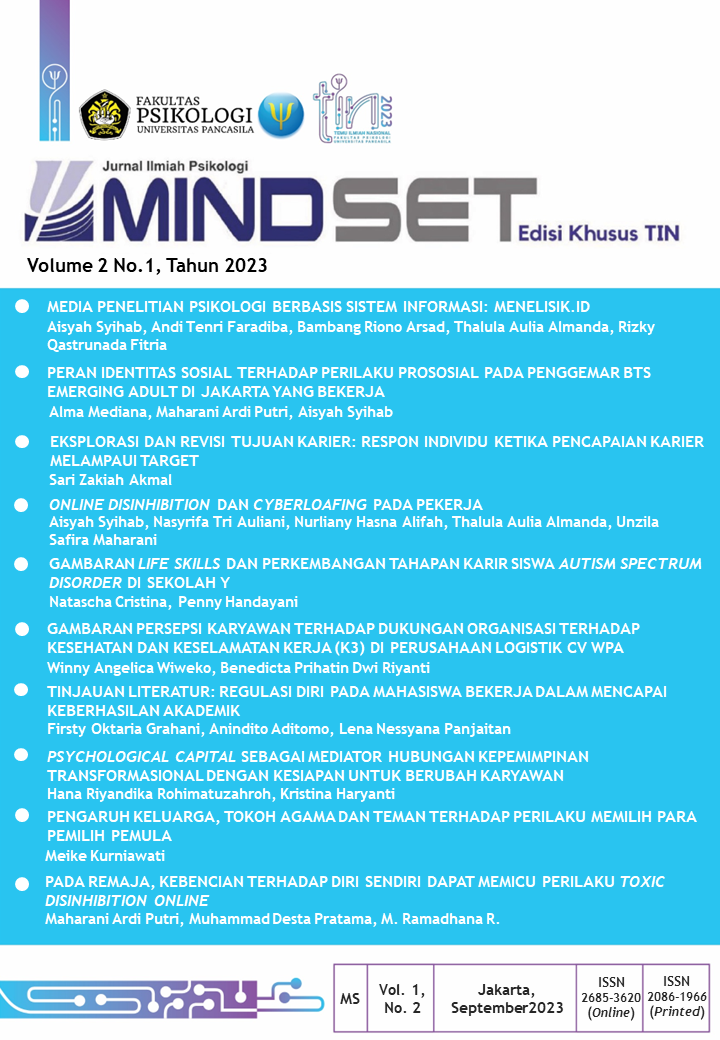Pengaruh Keluarga, Tokoh Agama dan Teman terhadap Perilaku Memilih Pemilih Pemula
DOI:
https://doi.org/10.35814/mindset.v2i01.5529Keywords:
general election, new voter, parents, peers, religious leadersAbstract
In the Indonesian General Election, 14 February 2024, it is predicted that first-time voters will increase significantly compared to the previous election. New voters are usually the focus of attention of parties or contestants because of their large number, and new voters are determinants the future, because most of them are the younger generation (millennial and Z). They usually do not have sufficient political education, and also have not made their choice. In political marketing, if someone doesn't have a choice, they usually tends to seek information, one of which is from a reference group. Reference groups are groups that become a reference for someone in behaving. Reference groups can consist of family (Parents), Religious Leaders and Peers. The purpose of this study was to determine the influence of Parents, Religious Leaders and Friends on the voting behavior of novice voters. Quantative research, data obtained from 278 respondents, analysis using simple regression. The results showed that Parents had a significant influence on the voting behavior 1.2%, Religious Leaders 7.1% and the influence of Friends 7.9%.
References
Geertz, C. (2014). Agama Jawa : Abangan, Santri, Priyayi dalam Budaya Jawa. Komunitas Bambu.
Haerul. (2022). Peran Tokoh Agama Dalam Meningkatkan Partisipasi Masyarakat Pada Pemilihan Gubernur Sulawesi Selatan Tahun 2018 Di Kota Makassar. Jurnal Governance & Politics (JGP). VOL 2, No 1. Hal 10 – 17
Handika, R., & Azmi, A. (2020). Marketing Politik Calon Legislatif Generasi Milenial. Journal of Civic Education, 3(1), 61-73. https://doi.org/10.24036/jce.v3i1.336
Irwan, H. (2020). Pendidikan Politik Kewarganegaraan Dalam Keluarga Studi Pada Peran Orang Tua Dalam Pendidikan Politik Di Musi Banyuasin. Program Studi Ilmu Politik Fakultas Ilmu Sosial Dan Ilmu Politik. Universitas Islam Negeri Raden Fatah Palembang. Skripsi: Tidak Diterbitkan
Martin, A. K. and Alan, J.Bush. (2000), “Do Role Models Influence Teenager’s Purchase Intention dan Behavior?”, Journal of Consumer Marketing, Vol. 17, pp. 441 – 445.
Nur, Raoda & Taufik, Ahmad & Tahir, Muhammad. (2015). Perilaku Politik Pemilih Pemula Dalam Pelaksanaan Pemilihan Presiden 2014 Di Desa Kanaungan Kecamatan Labakkang Kabupaten Pangkep. Otoritas : Jurnal Ilmu Pemerintahan. 5. 10.26618/ojip.v5i1.116.
Nurfadiah, R.T & Yulianti, A. (2017). Konformitas Dengan Kepercayaan Diri Pada Remaja Komunitas Pencinta Korea Di Pekanbaru. Psikoislamedia Jurnal Psikologi Volume 2 Nomor 2. Hal 212-223
Nursal Adman. 2004. Political Marketing : Strategi Memenangkan Pemilu. Jakarta: Gramedia Pustaka Utama.
Syahdanur (2016). Analisis Kelompok Referensi dan Nilai Partai Politik terhadap Brand Personality dan Citra Kandidat serta Dampaknya terhadap Keputusan Masyarakat dalam Memilih Kepala Daerah. Jurnal KIAT, Vol. 27, No. 1, Jun 2016. Hal 56 – 72.
Sutrisno (2018). Komparasi Teori Marketing Politik 4P Menurut Niffenegger dan 3P Menurut Adman Nursal. JPPUMA: Jurnal Ilmu Pemerintahan dan Sosial Politik UMA (Journal of Governance and Political Social UMA), 6 (2): 106-111. Desember 2018.
Tasary, D. (2013). Peran Teman Sebaya sebagai Agen Sosialisasi Politik dalam Menumbuhkan Perilaku Memilih Remaja Pada Pemilihan Walikota Tahun 2011 RT 02 RW 01 Kecamatan Umbulharjo. Jurnal Citizenship, Vol. 2 No. 2, Januari 2013.
Trihadi, J. ., & Nurmina, N. (2021). Pengaruh Dukungan Orang Tua terhadap Keputusan Memilih Pemilih Pemula pada Siswa Sekolah Menengah Atas di Kota Bukittinggi. Jurnal Pendidikan Tambusai, 5(3), 6332–6336. Retrieved from https://jptam.org/index.php/jptam/article/view/1948
Wardhani, P.S.N. (2018). Partisipasi Politik Pemilih Pemula dalam Pemilihan Umum. Jurnal
Pendidikan Ilmu-Ilmu Sosial, 10 (1): 57-62
https://www.kpu.go.id/berita/baca/11271/peran-sentral-tokoh-agama-dalam-pemilu)












